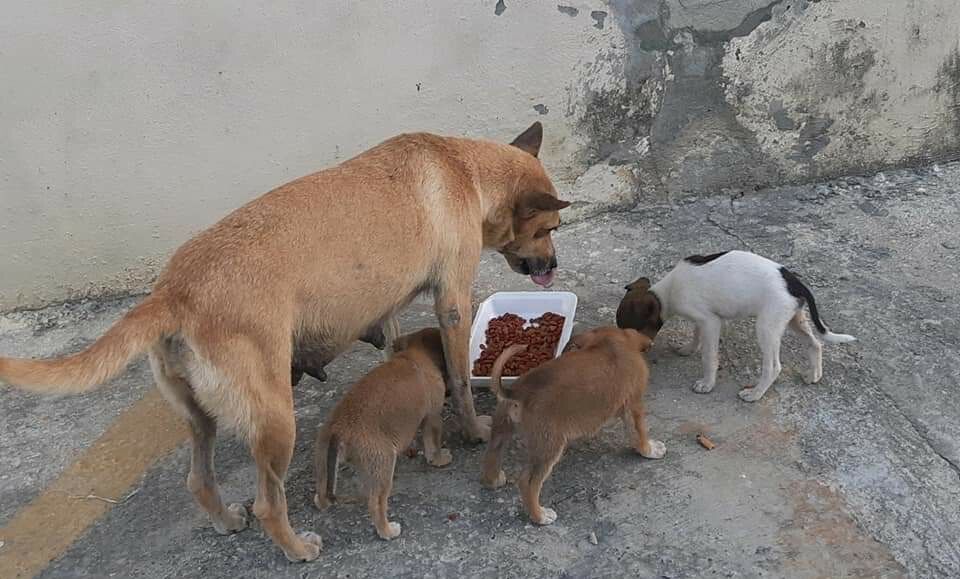The impact of COVID-19 on the global animal population
SPCA International offers unique insight on how the coronavirus pandemic is affecting animal shelters and rescues throughout the world, what’s being done to help now and what will be needed when the crisis is over.
Dogs in the Dominican Republic enjoy food purchased by SPCA International as part of a feeding program for community animals that had been relying on scraps from now-closed stores and restaurants. (image courtesy SPCA International)

As concerns over the spread of COVID-19 mounted, resulting in the temporary closure of many animal shelters and rescues, Americans answered the call to foster or adopt shelter animals in droves. But that hasn’t been the case globally. In many parts of the world where COVID-19 infections are prevalent, shelters have experienced plummeting adoption rates amid escalating fears about depleted resources. As borders closed, food shortages and high numbers of abandoned pets plagued some of the most heavily affected countries, including China, Italy and South Korea.
Enter SPCA International. “Our global partnerships gave us unique insight into what was happening,” Meredith Ayan, executive director of SPCA International, told dvm360 in a recent interview.
After receiving pleas from its partners in China early this year—and then from other parts of the world as the pandemic spread—SPCA International immediately began fundraising efforts. “Our Shelter Support Fund is trying to help shelters and animal organizations that are seeing an increase in abandonment rates, whether that is due to the owner passing away, someone becoming afraid of catching the virus from their pet or not being able to support the pet anymore because they’ve lost their job,” Ayan says.
International aid
To date, SPCA International has dedicated $100,000 in grants to respond to specific emergencies that continue to mount. “The way we’re helping looks both similar and different in each country,” Ayan explains.
- SPCA Italia received a special permit to rescue the many dogs and cats abandoned on the streets of Ardea, about 23 miles south of Rome. Funds from the organization will allow the group to continue rescuing and caring for these displaced animals.
- Typically, K9 Global Rescue relocates dogs from the canine meat trade in South Korea to homes in the United States. With an inability to transport the dogs, the grant money will enable the group to provide shelter, food and veterinary care until the dogs can travel.
- Unidad de Proteccion Animal, a shelter in the Dominican Republic, was facing severe food shortages. The organization has used its grant money to purchase enough food to last until normal supply chains reopen.
On a general level, Ayan says SPCA International is focused on stopping the spread of misinformation among people who are still able to care for their animals. “We need to make sure they know that there is no evidence that the disease can be passed from companion animals to humans,” she says.
Looking ahead
After the curve flattens and restrictions are lifted, the long-term challenges the world will face remain largely unknown. According to Ayan, however, recovery efforts in the United States look promising. “We’re hoping for lots of ‘foster failures’ [when people fostering an animal end up adopting the animal], which means organizations will be able to save more animals and we’ll see a reduction in animals in shelters,” she says.
But Ayan knows the narrative will be much different abroad. “Internationally, I foresee a really long road ahead,” she says. “As an organization, we’ve always focused on spay and neuter education efforts, so we will expect to have to double down on those efforts in the future.”
And while Ayan is clear that there have been no reports of culling due to COVID-19, it remains a concern. “In areas with large stray populations, whenever you have a disease that people believe can be passed from companion animals to humans—even though we have no evidence of this with COVID-19—you often see an increase in the culling of populations,” she explains. SPCA International is working to develop messaging aimed at promoting humane population control and preventing mass euthanization.
The organization also hopes the current pandemic will help put an end to legal and illegal wildlife trade practices. “We’ve seen strong links between wildlife trade and disease,” Ayan says, citing prior outbreaks like SARS (severe acute respiratory syndrome) and MERS (Middle East respiratory syndrome). “[The world] needs to learn from its mistakes and put pressure on people to stop these practices.”
How veterinary professionals can help
Veterinary professionals can support SPCA International’s efforts by reminding concerned clients that there is currently no evidence that COVID-19 can be spread from companion animals to people. Ayan says hospitals can advise clients to take certain precautions with their animals, which includes maintaining basic hygiene when handling and caring for pets, especially if the owner is feeling ill.
Pet owners should also make sure their pets practice social distancing from strangers. “It’s really hard to tell somebody ‘no’ when they want to pet your dog, but you have to be [your pet’s] advocate at this time,” she says.
SPCA International is accepting donations of surplus materials that hospitals may have on hand. “We send a lot of common supplies overseas, such as gauze, bandages, sutures and medications that may otherwise be cost-prohibitive,” she says. Food is also a vital need for many shelters around the world.
The staff is also open to receiving information and professional advice related to potential COVID-19 relief efforts. “Communication is so important at this time,” Ayan adds.
Veterinary professionals interested in donating veterinary supplies or providing professional advice can contact SPCA International at answers@spcai.org.
Amanda Carrozza is a freelance writer and editor in New Jersey.